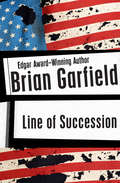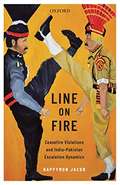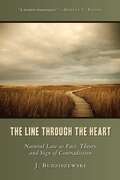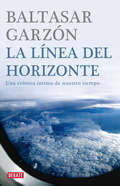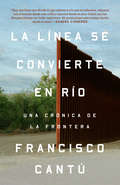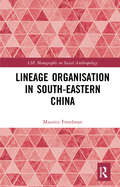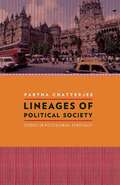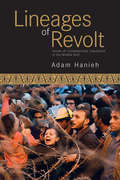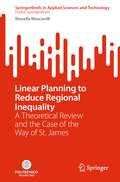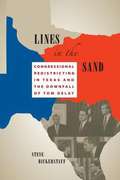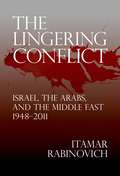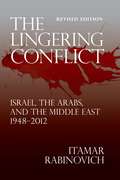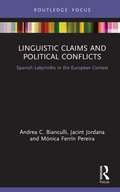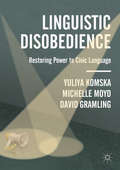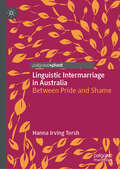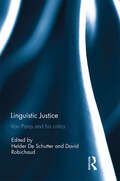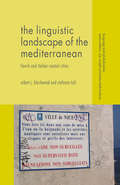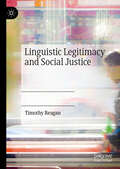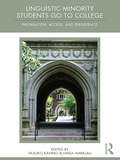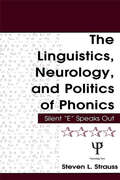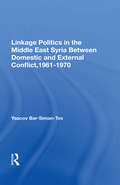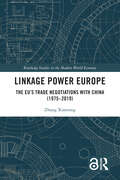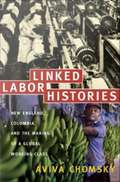- Table View
- List View
Line of Succession
by Brian GarfieldFive bombs upend the foundation of the American governmentSturka is an artist with explosives. A sturdy man approaching middle age, he learned his trade on the darkest battlefields of the twentieth century: Indochina, Palestine, Guyana, Biafra, and the fetid jungles of South America, where he fought alongside Che Guevera but was quick enough not to die with him. He doesn&’t know where his new employers hail from; he only knows how well they pay. Today he packs plastic explosive into the false bottoms of three handbags and two suitcases, to be left at strategic locations around Washington, D.C. But this is no ordinary café bombing. Today Sturka targets the men at the top of the American government. The attack causes a crisis of succession, the likes of which America has never seen. If the right man doesn&’t take charge quickly, the country will tear itself apart.
Line On Fire: Ceasefire Violations And India-pakistan Escalation Dynamics (Oxford International Relations In South Asia)
by Happymon Jacob Sumit Ganguly E. SridharanThe India–Pakistan border in Jammu & Kashmir has witnessed repeated ceasefire violations (CFVs) over the past decade. As relations between India and Pakistan have deteriorated, CFVs have increased exponentially. It is imperative to gain a deeper understanding of these violations owing to their potential to not only cause a crisis but also escalate an ongoing one. Line on Fire, part of the Oxford International Relations in South Asia series, postulates that the incorrect diagnosis of the reasons behind CFVs has led to wrong policies being adopted by both India and Pakistan to deal with the recurrent violations. Using fresh empirical data and first-hand accounts, the volume attempts to understand the reason why CFVs continue to take place between India and Pakistan despite consistent efforts to reduce the tension between the two nations. In doing so, it recontextualizes and enriches the prevailing arguments in contemporary literature on escalating dynamics and unenduring ceasefire agreements between the two South Asian nuclear rivals.
The Line Through the Heart: Natural Law as Fact, Theory, and Sign of Contradiction
by J. BudziszewskiWhy do we demand happiness on terms that make happiness impossible? And what can we do about it? Acclaimed philosopher J. Budziszewski addresses these questions in the brilliantly persuasive book The Line Through the Heart, finding the answers in the natural law. The journey of exploration takes us through politics, religion, ethics, law, philosophy, and more, with Budziszewski as expert guide. While investigating the natural law and its implications, Budziszewski boldly confronts a wide range of contemporary issues, offering a newly integrated view of abortion, evolution, euthanasia, capital punishment, runaway courts, and the ersatz state religion built in the name of religious toleration. Written in Budziszewski's usual crystalline style, The Line Through the Heart shows that natural law is a matter of concern not merely to scholars but to everyone, for it touches how each of us lives, and how all of us live together. His profound examination of this subject helps us make sense of why habits that run against our nature have become second nature, and why our world seems to be going mad.
La línea del horizonte
by Baltasar GarzónLa línea del horizonte recoge la visión de Baltasar Garzón sobre los problemas del mundo actual. ¿Qué es la justicia universal y cómo surgió? ¿Cómo se pueden defender los derechos humanos y el respecto a las víctimas en las frágiles transiciones a la democracia? ¿Qué futuro le espera a América Latina? Entre 2005 y 2006, Baltasar Garzón disfrutó de una excedencia que pasó como profesor de la Universidad de Nueva York. Fue un período dedicado a la reflexión sobre estas y otras grandes preguntas del mundo actual, en parte a través de un ciclo de debates en que participaron personalidades de todo el mundo, desde Kissinger y Ernesto Zedillo hasta Felipe González, John Kerry, Antonio Muñoz Molina, Rosa Díez, José Saramago o el presidente Zapatero. Así es esta obra, un diálogo a muchas voces, trufado de recuerdos y anécdotas personales, en la que el juez Garzón pasa revista a los temas más cruciales: los derechos humanos, el terrorismo, la seguridad, el futuro de la comunicación, la economía, América Latina... Un repaso completo y apasionante de la mano de uno de los actores más interesantes de este mundo globalizado.
La línea se convierte en río: Una crónica de la frontera
by Francisco Cantú"Una mirada hermosa, ferozmente honesta y, sin embargo, profundamente empática con los que vigilan la frontera y los migrantes que arriesgan -y pierden- sus vidas atravesándola. En tiempos de retórica política a menudo mal informada o francamente engañosa, este libro es una correctivo invaluable ". --Phil KlayPara Francisco Cantú, la frontera está en la sangre: su madre, una guardaparques e hija de un inmigrante mexicano, lo crió en los matorrales del suroeste. Atormentado por el paisaje de su juventud, Cantú se une a la Patrulla Fronteriza. Él y sus compañeros son enviados a regiones remotas atravesadas por rutas de drogas y corredores de contrabando, donde aprenden a rastrear a otros humanos bajo un sol abrasador y noches frías. Arrastran a los muertos y entregan a detención a los que encuentran vivos. Cantú intenta no pensar como se desenvuelven las historias desde allí. Acosado por las pesadillas, abandona la Patrulla por la vida civil. Pero cuando un amigo inmigrante viaja a México para visitar a su madre agonizada y no regresa, Cantú descubre que la frontera ha migrado con él, y ahora debe conocer toda la historia. Ardiente e inolvidable, The Line Becomes a River convierte en urgente y personal la violencia que nuestra frontera desata en ambos lados de la línea.
La línea se convierte en río
by Francisco CantúUno de los diez mejores libros de 2018 según el Washington Post Nominado al premio Orwell en el Reino Unido Para Francisco Cantú, la frontera está en la sangre. Su madre, una guardabosques del Servicio Nacional de Parques, hija de un inmigrante mexicano, lo crió en los matorrales del suroeste. Atormentado por el paisaje de su juventud, Cantú se alistó a la Patrulla Fronteriza. Él y sus compañeros son enviados a regiones remotas atravesadas por rutas de contrabando de drogas y tráfico de personas, donde aprenden a rastrear a otros humanos bajo el sol abrasador y noches heladas, arrastrando muertos y entregando a los que encuentran vivos. Cantú intenta no pensar en el final de esas historias. Acosado por pesadillas, Cantú abandona la Patrulla por la vida civil. Pero cuando un amigo inmigrante viaja a México para visitar a su madre y no regresa, Cantú descubre que la frontera migró con el, y esta vez tiene que conocer toda la historia. Intenso e inolvidable, La línea se convierte en río hace que sintamos la violencia de ambos lados de nuestra frontera como algo inmediato y personal.
Lineage Organisation in South-Eastern China (LSE Monographs on Social Anthropology)
by Maurice FreedmanThis essay is the work of a social anthropologist but it is not based upon field work. It is concerned with Chinese matters but it is not written by a sinologue. In this essay are the author’s reflections on certain aspects of southeastern Chinese society during the last hundred and fifty years, with attention on the Fukien and Kwangtung region of China has it has specialized not only in large-scale unilineal organization but also in sending people overseas.
Lineages of Political Society: Studies in Postcolonial Democracy (Cultures of History)
by Partha ChatterjeePartha Chatterjee, a pioneering theorist known for his disciplinary range, builds on his theory of "political society" and reinforces its salience to contemporary political debate. Dexterously incorporating the concerns of South Asian studies, postcolonialism, the social sciences, and the humanities, Chatterjee broadly critiques the past three hundred years of western political theory to ask, Can democracy be brought into being, or even fought for, in the image of Western democracy as it exists today? Using the example of postcolonial societies and their political evolution, particularly communities within India, Chatterjee undermines the certainty of liberal democratic theory in favor of a realist view of its achievements and limitations. Rather than push an alternative theory, Chatterjee works solely within the realm of critique, proving political difference is not always evidence of philosophical and cultural backwardness outside of the West. Resisting all prejudices and preformed judgments, he deploys his trademark, genre-bending, provocative analysis to upend the assumptions of postcolonial studies, comparative history, and the common claims of contemporary politics.
Lineages of Revolt
by Adam HaniehWhile the outcomes of the tumultuous uprisings that continue to transfix the Arab world remain uncertain, the root causes of rebellion persist. Drawing upon extensive empirical research, Lineages of Revolt tracks the major shifts in the region's political economy over recent decades. In this illuminating and original work, Adam Hanieh explores the contours of neoliberal policies, dynamics of class and state formation, imperialism and the nature of regional accumulation, the significance of Palestine and the Gulf Arab states, and the ramifications of the global economic crisis. By mapping the complex and contested nature of capitalism in the Middle East, the book demonstrates that a full understanding of the uprisings needs to go beyond a simple focus on "dictators and democracy."
Linear Planning to Reduce Regional Inequality: A Theoretical Review and the Case of the Way of St. James (SpringerBriefs in Applied Sciences and Technology)
by Rossella MoscarelliThis book explores the advantages of a linear model of planning in reducing regional inequalities. Linear planning, commonly discussed in the past as a method which plans the development of the city, is completely redefined here in the form of a design approach inspired by projects shaped by linear routes, such as cycle or walking paths. Such concept is applied to the urgent topic of territorial marginality which specifically neglects rural and mountainous areas and recently is coped by European and National policies. The analysis of these policies demonstrates the necessity of alternative strategies equipped to deal with both the internal and external causes that determine the critical conditions in these fragile environments. By implementing the concept of linear planning in these contexts, this book proposes to enlarge the perspective of traditional policies contrasting the regional inequalities that usually determine the design of projects just within the boundaries of the marginal areas. Cycle and walking paths are experimental cases of linear planning as they have not been influenced or formed by political boundaries and therefore are able to equally involve both the central and marginal zones. This book presents a review of current issues such as regional inequalities, with attention to their related policies, as well as an analysis of the concept of linear planning as seen through the study of one of the most famous cases of a walking path—the Way of St. James in Spain.
Lines in the Sand
by Steve BickerstaffThe events of 2003 in Texas were important to the political history of this country. Congressman Tom DeLay led a Republican effort to gerrymander the state's thirty-two congressional districts to defeat all ten of the Anglo Democratic incumbents and to elect more Republicans; Democratic state lawmakers fled the state in an effort to defeat the plan. The Lone Star State uproar attracted attention worldwide. The Republicans won this showdown, gaining six additional seats from Texas and protecting the one endangered Republican incumbent. This outcome has undeniably affected national policy-making and has made it more difficult for Democrats to regain a majority in the U. S. House of Representatives. Some of the methods used by DeLay to achieve this result, however, led to his criminal indictment and ultimately to his downfall. With its eye-opening research, readable style, and insightful commentary, Lines in the Sand provides a front-line account of what happened in 2003, often through the personal stories of members of both parties and of the minority activist groups caught in a political vortex. Law professor Steve Bickerstaff provides much-needed historical perspective and also probes the aftermath of the 2003 redistricting, including the criminal prosecutions of DeLay and his associates and the events that led to DeLay's eventual resignation from the U. S. House of Representatives.
The Lingering Conflict
by Itamar RabinovichIn The Lingering Conflict Itamar Rabinovich, a former chief negotiator for Israel, provides unique and authoritative insight into the prospects for genuine peace in the Middle East. His presentation includes a detailed insider account of the peace processes of 1992-96 and a frank dissection of the more dispiriting record since then.Rabinovich's firsthand experiences as a negotiator and as Israel's ambassador to the United States provide a valuable perspective from which to view the major players involved. Fresh analysis of ongoing situations in the region and the author's authoritative take on key figures such as Ehud Barak and Benjamin Netanyahu shed new light on the long and tumultuous history of Arab-Israeli relations. His book is a shrewd assessment of the past and current state of affairs in the Middle East, as well as a sober look at the prospects for a peaceful future.While Rabinovich explains the conflict between Israel and the Palestinians-a classic dispute between two national movements claiming the same land- The Lingering Conflict also considers the broader political, cultural, and increasingly religious conflict between the Jewish state and Arab nationalism. He approaches the troubled region in an international context, offering provocative analysis of America's evolving role and evaluation of its diplomatic performance.This book builds on the author's previous seminal work on geopolitics in the Middle East, particularly Waging Peace. As Rabinovich brings the Arab-Israeli conflict up to date, he widens the scope of his earlier insights into efforts to achieve normal, peaceful relations. And, of course, he takes full account of recent social and political tumult in the Middle East, discussing the Arab Spring uprisings-and the subsequent retaliation by dictators such as Syria's al-Asad and Libya's Qaddafi-in the context of Arab-Israeli relations.
The Lingering Conflict
by Itamar RabinovichIn The Lingering Conflict Itamar Rabinovich, a former chief negotiator for Israel, provides unique and authoritative insight into the prospects for genuine peace in the Middle East. His presentation includes a detailed insider account of the peace processes of 1992-96 and a frank dissection of the more dispiriting record since then.Rabinovich's firsthand experiences as a negotiator and as Israel's ambassador to the United States provide a valuable perspective from which to view the major players involved. Fresh analysis of ongoing situations in the region and the author's authoritative take on key figures such as Ehud Barak and Benjamin Netanyahu shed new light on the long and tumultuous history of Arab-Israeli relations. His book is a shrewd assessment of the past and current state of affairs in the Middle East, as well as a sober look at the prospects for a peaceful future.While Rabinovich explains the conflict between Israel and the Palestinians-a classic dispute between two national movements claiming the same land- The Lingering Conflict also considers the broader political, cultural, and increasingly religious conflict between the Jewish state and Arab nationalism. He approaches the troubled region in an international context, offering provocative analysis of America's evolving role and evaluation of its diplomatic performance.This book builds on the author's previous seminal work on geopolitics in the Middle East, particularly Waging Peace. As Rabinovich brings the Arab-Israeli conflict up to date, he widens the scope of his earlier insights into efforts to achieve normal, peaceful relations. And, of course, he takes full account of recent social and political tumult in the Middle East, discussing the Arab Spring uprisings-and the subsequent retaliation by dictators such as Syria's al-Asad and Libya's Qaddafi-in the context of Arab-Israeli relations.
The Lingering Conflict
by Itamar RabinovichIn The Lingering Conflict Itamar Rabinovich, a former chief negotiator for Israel, provides unique and authoritative insight into the prospects for genuine peace in the Middle East. His presentation includes a detailed insider account of the peace processes of 1992-96 and a frank dissection of the more dispiriting record since then.Rabinovich's firsthand experiences as a negotiator and as Israel's ambassador to the United States provide a valuable perspective from which to view the major players involved. Fresh analysis of ongoing situations in the region and the author's authoritative take on key figures such as Ehud Barak and Benjamin Netanyahu shed new light on the long and tumultuous history of Arab-Israeli relations. His book is a shrewd assessment of the past and current state of affairs in the Middle East, as well as a sober look at the prospects for a peaceful future.While Rabinovich explains the conflict between Israel and the Palestinians--a classic dispute between two national movements claiming the same land-- The Lingering Conflict also considers the broader political, cultural, and increasingly religious conflict between the Jewish state and Arab nationalism. He approaches the troubled region in an international context, offering provocative analysis of America's evolving role and evaluation of its diplomatic performance.This book builds on the author's previous seminal work on geopolitics in the Middle East, particularly Waging Peace. As Rabinovich brings the Arab-Israeli conflict up to date, he widens the scope of his earlier insights into efforts to achieve normal, peaceful relations. And, of course, he takes full account of recent social and political tumult in the Middle East, discussing the Arab Spring uprisings--and the subsequent retaliation by dictators such as Syria's al-Asad and Libya's Qaddafi--in the context of Arab-Israeli relations.
Linguistic Claims and Political Conflicts: Spanish Labyrinths in the European Context (Routledge Advances in European Politics)
by Andrea C. Bianculli Jacint Jordana Mónica Ferrín PereiraThis book explores and assesses the multiple levels at which linguistic policies can be challenged, devised and enacted, i.e. sub-national, national and supranational, and the variety of state and non-state actors involved. Moving beyond descriptive and normative approaches, it provides an empirical comparative assessment of the policy responses and strategies deployed to deal with linguistic diversity and conflicts in Spain, a country where almost one third of the population is at least bilingual in their own languages. The Spanish case is then assessed within the European context, both from the perspective of multilevel influence and mutual interaction, and from the learning experiences it may entail for similar or equivalent problems and disputes occurring at the European level or beyond. This text will be of key interest to scholars and students of Spanish politics, linguistics, identity politics and more broadly of European politics and governance, public policy, education and communication policy and comparative politics.
Linguistic Disobedience: Restoring Power to Civic Language
by Yuliya Komska Michelle Moyd David GramlingThis book asks how we—as citizens, immigrants, activists, teachers—can counter the abuse of language in our midst. How can we take back the power of language from those who flaunt that power to silence or erase us and our fellows? In search of answers, Linguistic Disobedience recalls ages and situations that made critiquing, correcting, and caring for language essential for survival. From turn-of-the-twentieth-century Central Europe to the miseries of the Third Reich, from the Movement for Black Lives to the ongoing effort to decolonize African languages, the study and practice of linguistic disobedience have been crucial. But what are we to do today, when reactionary supremacists and authoritarians are screen-testing their own forms of so-called disobedience to quash oppositional social justice movements and their languages? Blending lyric essay with cultural criticism, historical analysis, and applied linguistics, Linguistic Disobedience offers suggestions for a hopeful pathway forward in violent times.
Linguistic Intermarriage in Australia: Between Pride and Shame
by Hanna Irving TorshThis book examines the experiences of couples with different language backgrounds and different cultural origins as they negotiate love, partnership and parenting. It is based on the author’s doctoral research into the attitudes and experiences of the English-speaking background (ESB) partners of non-English-speaking background (NESB) migrants in Sydney, Australia. In particular, it seeks to understand how these English speakers negotiate being in a romantic relationship with someone who has a different first language. It explores how those from an ESB reconcile the negative perspectives of Anglophone culture towards “other” languages, with their desire to be a good partner who respects the linguistic differences in their relationship. The book is organised into six chapters, which move from a focus on the language of the individual, to the languages of the couple, and then to the wider family. The main finding is that although ESB partners had very different beliefs and attitudes towards language learning to their migrant partners, they attempted to compensate for these differences in various ways. It will be of particular interest to students and scholars in the fields of language education, minority languages, and language policy and planning.
Linguistic Justice: Van Parijs and his Critics
by Helder DavidThe world contains over 6000 languages and less than 200 states to accommodate them. This creates the important normative question of how to respond politically to linguistic diversity. What is a just language policy? Are language minorities entitled to language protection? Should language rights be accorded to immigrants? Is the universal rise of English as a lingua franca to be applauded or to be regretted? The most important and comprehensive thinker within this debate over linguistic justice is Philippe Van Parijs. In his bold and controversial theory of linguistic justice, Van Parijs argues that the rise of English is a good thing, as well as that all language groups are entitled to grab a territory on which only their language receives public recognition. This collection, bringing together some of the most influential contemporary political philosophers, presents a critical review of Van Parijs’s theory and gives a state-of-the-art overview of the prevailing positions on linguistic justice within political philosophy. It will be of interest to students and scholars studying philosophy, politics, linguistics, international relations and law. This book was published as a special issue of Critical Review of International Social and Political Philosophy.
The Linguistic Landscape of the Mediterranean: French and Italian Coastal Cities (Language and Globalization)
by Stefania Tufi Robert J. BlackwoodThis book explores the Linguistic Landscapes of ten French and Italian Mediterranean coastal cities. The authors address the national languages, the regional languages and dialects, migrant languages, and the English language, as they collectively mark the public space.
Linguistic Legitimacy and Social Justice
by Timothy ReaganThis book examines the nature of human language and the ideology of linguistic legitimacy – the common set of beliefs about language differences that leads to the rejection of some language varieties and the valorization of others. It investigates a broad range of case studies of languages and dialects which have for various reasons been considered 'low-status' including: African American English, Spanglish, American Sign Language, Yiddish, Esperanto and other constructed languages, indigenous languages in post-colonial neo-European societies, and Afrikaans and related language issues in South Africa. Further, it discusses the implications of the ideology of linguistic legitimacy for the teaching and learning of foreign languages in the US. Written in a clear and accessible style, this book provides a readable and pedagogically useful tool to help readers comprehend the nature of human language, and the ways in which attitudes about human language can have either positive or negative consequences for communities and their languages. It will be of particular interest to language teachers and teacher educators, as well as students and scholars of applied linguistics, intercultural communication, minority languages and language extinction.
Linguistic Minority Students Go to College: Preparation, Access, and Persistence
by Yasuko Kanno Linda HarklauCurrently, linguistic minority students – students who speak a language other than English at home – represent 21% of the entire K-12 student population and 11% of the college student population. Bringing together emerging scholarship on the growing number of college-bound linguistic minority students in the K-12 pipeline, this ground-breaking volume showcases new research on these students’ preparation for, access to, and persistence in college. Other than studies of their linguistic challenges and writing and academic literacy skills in college, little is known about the broader issues of linguistic minority students’ access to and success in college. Examining a variety of factors and circumstances that influence the process and outcome, the scope of this book goes beyond students’ language proficiency and its impact on college education, to look at issues such as student race/ethnicity, gender, SES, and parental education and expectations. It also addresses structural factors in schooling including tracking, segregation of English learners from English-fluent peers, availability and support of institutional personnel, and collegiate student identity and campus climate. Presenting state-of-the-art knowledge and mapping out a future research agenda in an extremely important and yet understudied area of inquiry, this book advances knowledge in ways that will have a real impact on policy regarding linguistic minority immigrant students’ higher education opportunities.
The Linguistics, Neurology, and Politics of Phonics: Silent "E" Speaks Out
by Steven L. StraussThis book explores the driving forces behind the current government-sponsored resurrection of phonics, and the arguments used to justify it. It examines the roles played by three key actors--corporate America, politicians, and state-supported reading researchers--in the formulation of what Strauss terms the neophonics political program. Essential for researchers, students, and teachers of literacy and reading, and for anyone seeking to understand what is happening in U.S. public schools today, The Linguistics, Neurology, and Politics of Phonics: Silent "E" Speaks Out:*analyzes the political nature of the alleged literacy crisis in the United States, through an investigation of the political and corporate motives behind the renewed focus on phonics, and media complicity in promoting the neophonics political program as the solution to the so-called crisis;*examines the scientific claims of neophonics, including methodology, linguistics, and neuroscience, and exposes the flaws in its reasoning and the weakness of its arguments;*addresses the scientific, empirical investigation of letter-sound relationships in English (of phonics itself), and demonstrates the complexity of the system and its associated benefits and limitations in the theory and practice of reading;*proposes actions to help make a return to politically undistorted science and to democratic classrooms a reality; and*introduces, in a postscript, a formal analysis of the letter-sound system, using empirically based rules to convert one finite set of elements, the alphabet, into another, the phonemes of the spoken language. Offering up-to-date information and an original critique, this book makes two important contributions. One is the policy analysis linking government agencies, policymakers, and corporate interests. The second is the neurological and linguistic treatment of why traditional phonics programs are not the solution and why the rhetoric developed to support their resurgence is so far off the mark.
Linkage Politics In The Middle East: Syria Between Domestic And External Conflict, 1961-1970
by Yaacov Bar-siman-tovTraditional studies of linkage politics tend to assume that internal political instability leads a government to divert attention from internal problems by initiating an external conflict or stressing the pressures of international problems. In contrast, quantitative studies typically conclude that there is little or no relationship between interna
Linkage Power Europe: The EU’s Trade Negotiations with China (1975-2019) (Routledge Studies in the Modern World Economy)
by Zhang XiaotongThis book looks at the history of the EU’s trade negotiations with China from 1975 to 2019 from a distinctive perspective – the EU as a linkage power. The author explains how the EU through linkage strategies speaks with one voice, overcomes its weakness in military capabilities and translates its non-military capabilities into advantages and influences in some specific policy areas. The book systematically traces the European negotiators’ tactics in managing the EU’s trade relations with China. It’s the first time that the history of EU–China trade negotiations is presented to the public by a seasoned trade negotiator. The author, combining the identities of a negotiator and a scholar, gives a panoramic view of EU–China trade relations from 1975, when the European Economic Community established diplomatic relations with China, to 2019 when the Juncker Commission leaves office. This book will appeal to policymakers, think-tankers, professors and students, as well as anyone who is interested in trade policies and negotiations in the EU and China.
Linked Labour Histories: New England, Colombia, and the Making of a Global Working Class
by Aviva ChomskyExploring globalization from a labor history perspective, Aviva Chomsky provides historically grounded analyses of migration, labor-management collaboration, and the mobility of capital. She illuminates the dynamics of these movements through case studies set mostly in New England and Colombia. Taken together, the case studies offer an intricate portrait of two regions, their industries and workers, and the myriad links between them over the long twentieth century, as well as a new way to conceptualize globalization as a long-term process. Chomsky examines labor and management at two early-twentieth-century Massachusetts factories: one that transformed the global textile industry by exporting looms around the world, and another that was the site of a model program of labor-management collaboration in the 1920s. She follows the path of the textile industry from New England, first to the U. S. South, and then to Puerto Rico, Japan, Mexico, Central America, the Caribbean, and Colombia. She considers how towns in Rhode Island and Massachusetts began to import Colombian workers as they struggled to keep their remaining textile factories going. Most of the workers eventually landed in service jobs: cleaning houses, caring for elders, washing dishes. Focusing on Colombia between the 1960s and the present, Chomsky looks at the Urab banana export region, where violence against organized labor has been particularly acute, and, through a discussion of the AFL-CIO's activities in Colombia, she explores the thorny question of U. S. union involvement in foreign policy. In the 1980s, two U. S. coal mining companies began to shift their operations to Colombia, where they opened two of the largest open-pit coal mines in the world. Chomsky assesses how different groups, especially labor unions in both countries, were affected. Linked Labor Histories suggests that economic integration among regions often exacerbates regional inequalities rather than ameliorating them.
